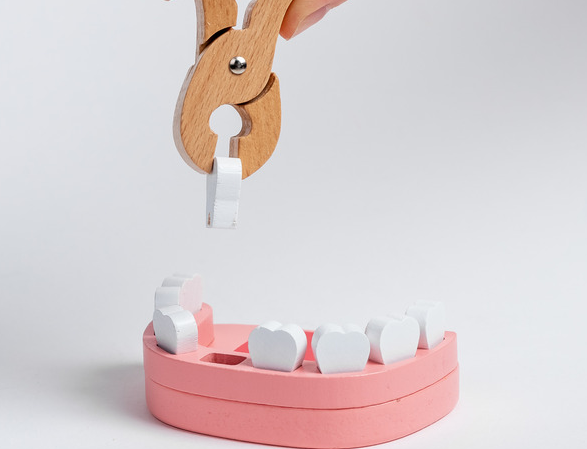DENTAL EXTRACTIONS
Whenever possible, dentists will prioritize saving your natural tooth. Tooth extraction is usually seen as a last resort.

While a healthy smile is a priority, sometimes even the best dental care can’t save a tooth. This page will explore the reasons why a dentist might recommend a dental extraction, a procedure seen as a last resort.
We’ll delve into the common scenarios that necessitate tooth removal, the extraction process itself, and the crucial post-operative steps for a smooth recovery.
Why Might You Need A Dental Extraction?
Dental extractions are not performed lightly. Dentists strive to preserve natural teeth whenever possible. However, certain conditions may leave no alternative but to proceed with an extraction to uphold overall oral health.
Among these conditions are:
- Severe Tooth Decay: When decay penetrates deep into the tooth, affecting its integrity and making it impossible to restore with a filling or crown, this not only compromises the tooth’s structure but can also lead to significant pain and sensitivity, necessitating its removal to alleviate discomfort and prevent the spread of decay to neighboring teeth.
- Advanced Gum Disease: This can lead to teeth becoming loose by destroying the supporting bone structure and ligaments, thereby compromising the stability of teeth and often leading to tooth loss. The progression of gum disease can cause persistent bad breath, bleeding gums, and significant discomfort, making extraction a necessary step to halt further oral deterioration.
- Impacted Teeth: Wisdom teeth, for example, may not emerge properly, causing discomfort, infection, or harm to adjacent teeth. This impaction can lead to cyst formation, damage to adjacent teeth roots, and can even affect the jawbone, necessitating their removal to prevent serious complications.
- Infection: If an infection is resistant to antibiotics or root canal therapy, extraction may be necessary to prevent its spread. Such infections can sometimes lead to systemic issues if not addressed, with the potential to affect vital organs through the spread of bacteria via the bloodstream.
- Trauma: Accidents or sports injuries can damage teeth and their roots beyond repair. The impact can cause fractures extending below the gum line, making it impossible to reconstruct the tooth even with advanced dental restoration techniques. This can lead to the necessity of extraction to prevent infection and alleviate pain, while also making way for replacement options such as implants or bridges.
The Dental Extraction Procedure Explained
Dental extractions are conducted with the utmost care to minimize discomfort.
The process typically involves:
- Pre-Procedure Examination: A thorough examination, including X-rays, to determine the best approach for the extraction.
- Anesthesia: Local anesthesia is administered to numb the area, ensuring the patient experiences no pain, only pressure or minor discomfort.
- Extraction: Specialized tools are used to gently loosen and remove the tooth from its socket.
Post-Extraction Care and Recovery
Recovery varies among individuals, but adherence to post-operative instructions accelerates healing.
Key guidelines include:
- Pain Management: Over-the-counter pain relievers and ice packs can alleviate discomfort and swelling.
- Activity Limitation: Avoid strenuous activities for a few days to prevent bleeding from the extraction site.
- Diet: Stick to soft foods and avoid anything hard, crunchy, or sticky that might disturb the extraction site.
- Oral Hygiene: Gentle rinsing with salt water can aid in healing, but vigorous rinsing or spitting should be avoided initially.
Dietary Considerations After an Extraction
The importance of maintaining a suitable diet post-extraction cannot be overstressed. Initially, the diet should consist of:
- Soft Foods: Such as yogurts, soups, and applesauce, which do not require extensive chewing.
- Avoidance of Certain Foods: Hard, spicy, or very hot foods that might irritate the extraction site.
Complications and How to Avoid Them
While dental extractions are generally safe, potential complications include dry socket and infection. These can largely be avoided by following the dentist’s aftercare instructions diligently.
When to Seek Further Care
Patients should contact their dentist if they experience severe pain, swelling that worsens after a few days, or signs of infection such as fever, pus, or unpleasant taste.

Is dental extraction painful?
A dental extraction is typically performed under local anesthesia, which numbs the area around the tooth being removed. Patients will feel some pressure or discomfort during the procedure, but they should not feel pain. After the extraction, patients may experience some pain or swelling, but this can usually be managed with over-the-counter pain relievers and ice packs.
How long is the recovery from a tooth extraction?
The recovery time after a tooth extraction can vary depending on the individual and the complexity of the extraction. Most people can expect to feel some discomfort and swelling for a few days after the procedure. It’s important to follow the post operative instructions provided by your dentist, such as avoiding smoking, spitting, or using a straw for the first 24 hours after the procedure and sticking to a soft-food diet for the first few days.
What can I eat after a tooth extraction?
For the first few days, it’s best to stick to soft, easy-to-chew foods such as soups, smoothies, and mashed potatoes. Avoid hard, crunchy, or chewy foods that can irritate the extraction site. Once the site has healed, you can gradually reintroduce harder foods into your diet.

CALL THE DIABLO DENTAL GROUP OR BOOK AN APPOINTMENT ONLINE TODAY
Don’t let dental pain or discomfort take over your life. Contact The Diablo Dental Group today to schedule your consultation. Our team is ready to assist you in achieving optimal oral health and restoring your smile. You can call us or book your appointment online.
Let us be your partner in maintaining a healthy, vibrant smile for years to come.
